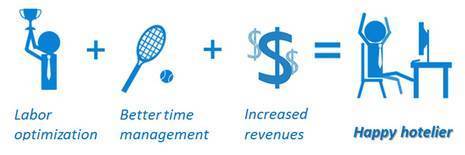The slogan of the successful Revenue Management is to sell the right product to the right customer at the right time and for the right price. It sounds relatively simple but is not easy to accomplish. How do we know when the right time comes, what the right price is and what types of customers we should target?
Revenue Management is all about predictions and decisions: predictions about how much and what type of business to expect, and the subsequent decisions a manager makes to get the most revenue (and profit) from that business, through dynamic pricing and other important Revenue Management actions. Management decisions (pricing and others) are based on analysis of vast amounts of information about booking pace, booking history, competitors’ rates, hotels’ parameters and specifics, and others.
 Many decisions are made in the condition of “uncertainty“. What flow of customers is expected and what will their pricing preferences be? What will be the policy of the competing hotels? How are the future events going to influence the revenue (i.e. airfares or the construction next door)? The most important thing is that these uncertainties are coming up in the future, but the rooms are sold in advance and price decisions have to be made right now. At the same time these decisions have distant consequences. If you sell most of your rooms at a low rate, the occupancy will certainly increase, but you may miss your chance to earn more by selling to more profitable clients closer to the arrival date.
Many decisions are made in the condition of “uncertainty“. What flow of customers is expected and what will their pricing preferences be? What will be the policy of the competing hotels? How are the future events going to influence the revenue (i.e. airfares or the construction next door)? The most important thing is that these uncertainties are coming up in the future, but the rooms are sold in advance and price decisions have to be made right now. At the same time these decisions have distant consequences. If you sell most of your rooms at a low rate, the occupancy will certainly increase, but you may miss your chance to earn more by selling to more profitable clients closer to the arrival date.
Should I accept an appealing offer from a group of 30 people? If so, I will have to agree to offer a significant discount, but this would bring me revenue today. But… would the hotel be able to earn more on future clients, if we decline this group booking request? On the other hand, would the additional revenues (from the restaurant and the banquet hall) offset the lower income from this group, due to the discount we’re offering them? So what should the ultimate price of this sale be?
Be the first to know, sign up here and stay up to date with our latest revenue management news, updates and special offers
The science of revenue management gives some rationalized answers to these questions. Applied to a particular practice, the science is called Revenue Management or Yield Management.
 Although, some individual tasks of Revenue Management can be performed manually, the most efficient way to handle data and generate profits is through Revenue Management Software (RMS).
Although, some individual tasks of Revenue Management can be performed manually, the most efficient way to handle data and generate profits is through Revenue Management Software (RMS).
That’s why many hoteliers choose to employ specialized computer programs dedicated to Revenue Management automation.
Today, thanks to the great achievements in computer technology and computer networks, affordable automated Revenue Management has become available for low- and middle-tier hotels, small hotel chains and independent properties (one example is iRates RMS that was designed specifically for these hospitality segments). Applying computer programs to Revenue Management in hotel business is now widely spread in the US and European markets.
Computer Revenue Management programs analyze large amounts of information about booking pace, historic reservation data, compset pricing, etc. Various Hotel Revenue Management Systems (RMS) presented on the market today differ greatly in their functions. On one side, there are strictly informative/analytical systems that will only perform functional data presentation on the computer (tablet) screen. On the other side, there are systems that are able to make final decisions in a completely automated mode. Many Revenue Management Systems are positioned somewhere in between those two. They suggest room rates or recommend sales volume at a given rate. The most advanced programs are based on sophisticated algorithms of modeling, forecasting and optimization. Some systems include elements of artificial intelligence and methods of adaptation (customization) to the hotel’s specific characteristics.
 Benefits of an automated Revenue Management System
Benefits of an automated Revenue Management System
- The effectiveness of revenue management actions (and dynamic pricing in particular) is greatly increased with an RMS. Using an automated Revenue Management System can lead to 10-15% revenue increase in general (or higher in many cases).
- For hotels that spend their time on “manual” management, an RMS system will allow to optimize labor (lower payroll expenses)
- eliminate significant errors in pricing decisions, especially in the conditions of economic instability.
- Such systems also allow managers to save time on routine analytical tasks and concentrate on more important strategic decisions.
All of the above, along with increased revenues (and profits) as well as stabilization of results, makes managers’ lives easier, increases their productivity and helps grow revenues more significantly.






